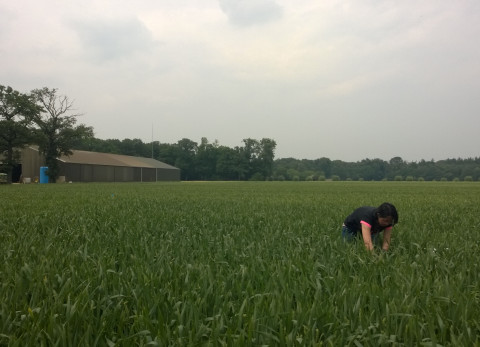'It depends': soil organic matter doesn't automatically increase crop yield

'It depends': soil organic matter doesn't automatically increase crop yield
Press inquiries
Organic matter is valuable for agricultural production. It's full of nutrients that are vital for plant growth, improves the structure of the soil and has many other positive effects. Not surprisingly, then, the assumption has been that more organic matter in the soil will automatically lead to a higher crop yield.
But the research Stijn van Gils did for his PhD thesis complicates this assumption. "At first glance, it does seem to work like that, for very different types of fields...but look more closely, and you'll see that it actually doesn't", says Van Gils.
As long as he and his fellow researchers compared fields from across Europe, or conducted experiments under controlled greenhouse conditions, they did indeed find that a greater amount of soil organic matter (SOM) would have a positive effect.
But when they compared agricultural parcels which were entirely similar except for one having a high percentage of soil organic matter while the other didn't, it was a different story. "Under agricultural field conditions, I didn't find that this difference had a consistent impact on crop yield."
Not a win-win
Van Gils' research serves as a caution to policy makers not to draw premature conclusions when it comes to soil organic matter: adding more organic material to the soil may not automatically be the win-win for both climate and agriculture that they're looking for.
The NIOO researchers believe that organic matter content is in itself too crude a criterion to draw any reliable conclusions about crop yield. "It's not an issue if you're looking at carbon sequestration in the soil", says Van Gils, "but if your aim is to improve yield, it may well be problematic."
His thesis supervisor, NIOO's head of Terrestrial Ecology Wim van der Putten, adds: "if you're planning to increase the soil organic matter content as part of worldwide measures to protect the climate, then you should also consider the quality of the soil organic matter you use, not just the quantity."
It's something policy makers and farmers should both start to take into account as of now. Meanwhile, what actually constitutes 'good quality' soil organic matter is currently being researched in a new project: Vital Soils.
Van der Putten: "It very likely has to do with the ratio of easily degradable and persistent organic residues in the soil." This ratio simultaneously affects soil chemistry, soil life and soil structure - "factors that together form an interesting trinity in the soil."
Sustainable boost
Stijn van Gils did his PhD research as part of a major European project that includes the Netherlands, Sweden, Britain, Germany, Poland, Hungary and Italy. The project asks how organic matter affects both plant growth and the insects on those plants.
Van Gils: "If we understood aboveground-belowground interactions in agro-ecosystems, we could use that knowledge to give food production a sustainable boost."
___________________________________________________________________________________
With more than 300 staff members and students, NIOO is one of the largest research institutes of the Royal Netherlands Academy of Arts and Sciences (KNAW). The institute specialises in water and land ecology. As of 2011, the institute is located in an innovative and sustainable research building in Wageningen, the Netherlands. NIOO has an impressive research history that stretches back 60 years and spans the entire country, and beyond.
More information:
- Thesis supervisor Prof.dr. Wim van der Putten, dept. of Terrestrial Ecology NIOO-KNAW, tel. +31-317-473599/+31-6-51193157, w.vanderputten@nioo.knaw.nl
- Science information officer Froukje Rienks, NIOO-KNAW, tel +31-6-10487481 / +31-317-473590, f.rienks@nioo.knaw.nl
Photographs: research in a grain field (see 'Downloads' on this page). Source: Stijn van Gils / NIOO-KNAW
Thesis: It depends: effects of soil organic matter in aboveground-belowground interactions in agro-ecosystems.
